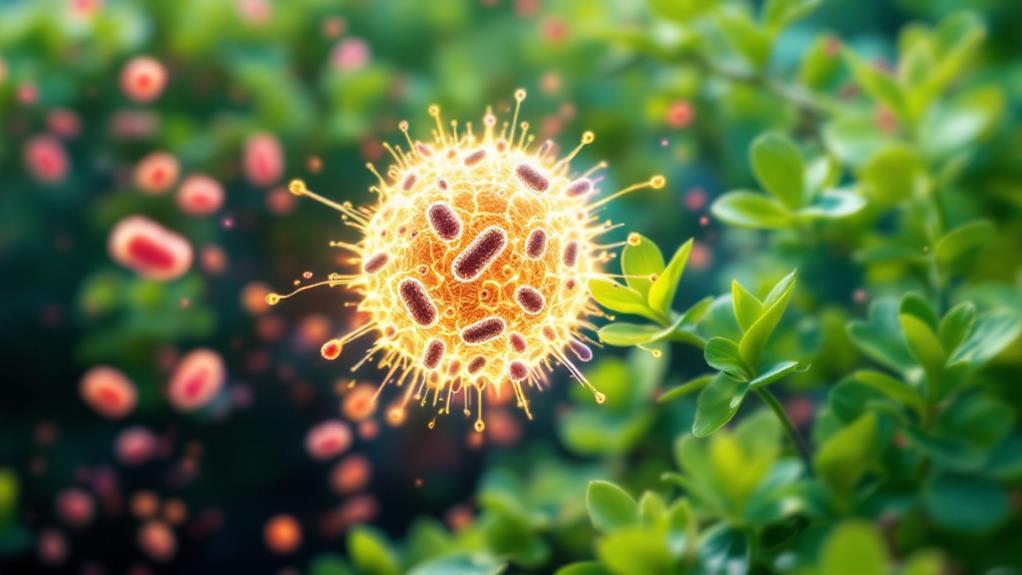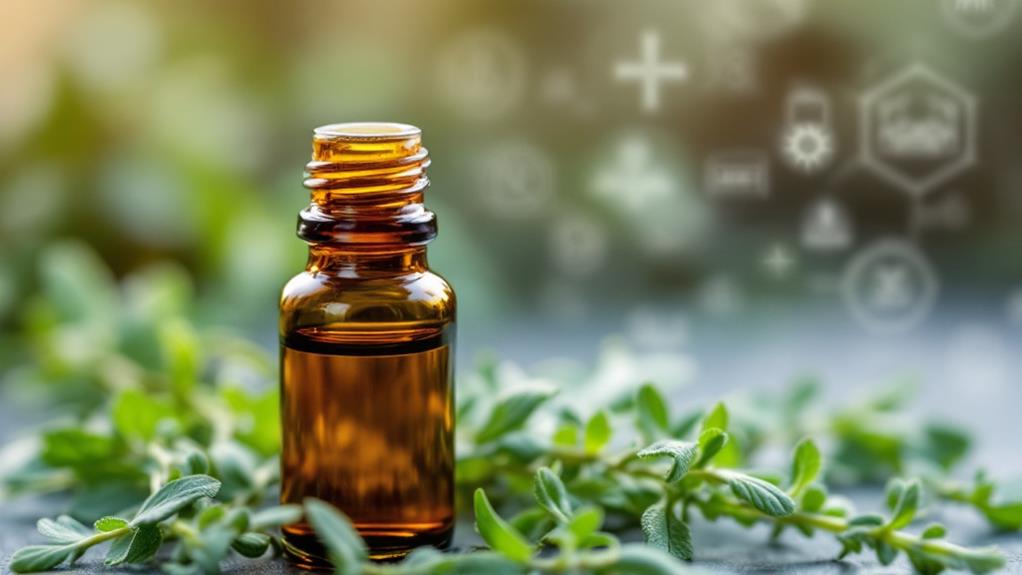What Is Carvacrol? Exploring Its Benefits for Health and Wellness

You should know that carvacrol is a remarkable natural compound mainly found in oregano, offering a variety of health benefits. It has antimicrobial properties that help fight pathogens like E. coli, and it's a potent antioxidant, protecting your cells from oxidative stress. Consuming carvacrol supports your immune system, aids digestion, and may even assist in managing blood sugar levels. Besides health, it acts as a natural preservative, enhancing food safety. While generally safe, high doses might cause some gastrointestinal upset, so moderation is key. There's much more to uncover about carvacrol's health-enhancing potential.
Understanding Carvacrol
Understanding carvacrol begins with knowing its origins and properties. Carvacrol is a monoterpenoid phenol primarily extracted from oregano, scientifically known as Origanum vulgare. Its chemical formula, C10H14O, underlines its unique composition, contributing to its impressive health benefits. You'll find carvacrol renowned for its potent antimicrobial properties, effectively tackling harmful bacteria like E. coli and Salmonella. This makes it a valuable ally in food safety and preservation.
But that's not all—carvacrol is also celebrated for its antioxidant capabilities. It helps protect your cells from oxidative damage, which can reduce the risk of chronic diseases associated with oxidative stress. Imagine a compound that not only defends against microbial threats but also shields your body from internal oxidative harm.
Moreover, carvacrol's benefits extend to reducing inflammation and supporting digestive health. Research indicates its potential in managing blood sugar levels, offering a natural approach to maintaining digestive wellness. While carvacrol is generally recognized as safe for food use, be cautious with high doses, as they might irritate the digestive tract. By understanding carvacrol, you open the door to a potential powerhouse for enhancing overall wellness.
Natural Sources of Carvacrol
Many might not realize that carvacrol, a powerful compound with numerous health benefits, is naturally abundant in certain herbs. Oregano, particularly the wild variety known as Origanum vulgare, is renowned for its high concentration of carvacrol, making it a staple in the world of natural remedies. This compound is celebrated for its antioxidant and antimicrobial properties, which contribute to the overall wellness benefits of oregano.
Beyond oregano, you'll find carvacrol in vital oils derived from thyme, marjoram, and some mint species. These oils are not only aromatic but also packed with therapeutic qualities, thanks to the presence of carvacrol. The extraction process typically involves steam distillation of the dried leaves and stems of these plants, resulting in concentrated oil formulations that are rich in this beneficial compound.
Carvacrol's safety is well-recognized by regulatory agencies, which approve its use as a natural preservative and flavoring agent in foods. This makes it an excellent supplement to your health regimen. Available in both liquid and capsule forms, you can easily incorporate carvacrol into your daily routine, reaping its antioxidant and antimicrobial benefits while enjoying the natural essence of these herbs.
Immune System Support

Carvacrol is more than just a compound found in nature's aromatic herbs; it plays a significant role in supporting your immune system. Extracted from Origanum vulgare, commonly known as oregano, carvacrol improves your body's defense mechanisms, helping to fend off infections and diseases. It's a potent antioxidant, protecting immune cells from oxidative stress and damage. By reducing inflammation, carvacrol promotes a balanced immune reaction, ensuring that your immune responses are neither too weak nor overly aggressive.
Research highlights several health benefits of carvacrol for your immune system:
- Antioxidant Protection: Shields immune cells from oxidative damage, maintaining their functionality.
- Anti-inflammatory Properties: Helps reduce inflammation, promoting a balanced immune response.
- Pathogen Defense: Inhibits the growth of different pathogens like bacteria and fungi, strengthening your immune system's effectiveness.
- Gut Health Support: By modulating gut microbiota, carvacrol improves immune function, as a significant portion of your immune system resides in the gastrointestinal tract.
Incorporating carvacrol into your routine could provide these benefits, bolstering your immune system and contributing to general wellness. Embracing this natural compound may be a simple yet effective way to support your health.
Digestive Health Benefits
A significant number of individuals struggle with digestive issues, but incorporating carvacrol into your health regimen could offer relief. This compound has shown promise in enhancing digestive health by addressing symptoms associated with small intestine bacterial overgrowth (SIBO). If you've ever experienced abdominal pain and bloating, carvacrol might help alleviate these uncomfortable symptoms. By promoting a healthier balance in your gut microbiota, carvacrol supports a more efficient digestive environment. This balance is essential for ideal nutrient absorption, ensuring your body gets the most out of the foods you consume.
Carvacrol's anti-inflammatory properties also play an important role in reducing gastrointestinal inflammation. Chronic inflammation in the gut can lead to discomfort and multiple digestive disorders, but with carvacrol, you might experience improved gut health and greater overall comfort. Additionally, its ability to provide pain relief in the gastrointestinal system can make a noticeable difference in your day-to-day wellness.
While carvacrol is known for its antimicrobial effects, which aid in reducing the risk of harmful bacterial infections in the digestive tract, its primary contributions to digestive health lie in its ability to improve gut function and ease inflammation-related symptoms.
Antimicrobial Effects

Renowned for its potent antimicrobial effects, carvacrol is a powerhouse in combating harmful microorganisms. You'll find that carvacrol exhibits strong antimicrobial properties, especially against food-borne pathogens like Escherichia coli and Salmonella. This makes it a valuable natural preservative, improving food safety by preventing these harmful bacteria from thriving. Not only does it disrupt bacterial cell membranes leading to cell death, but it also excels in preventing biofilm formation, which is vital in battling persistent bacterial colonies.
In addition to its antibacterial prowess, carvacrol is effective against multiple fungi, particularly Candida species. This highlights its potential as an antifungal agent both in therapeutic applications and as a food preservative. Its capability to reduce harmful organisms like Listeria on surfaces further underscores its significance in maintaining hygiene and safety. Plus, when combined with other critical oil compounds, carvacrol's antimicrobial activity is improved, offering potential synergistic effects against resistant strains.
Here's what carvacrol can do for you:
- Inhibit growth of Escherichia coli and Salmonella
- Prevent biofilm formation
- Act as a natural preservative
- Combat Candida and other fungi
Incorporating carvacrol into your routine could be a game-changer for health and food safety.
Antioxidant Properties
While carvacrol is celebrated for its antimicrobial prowess, its benefits don't stop there. This remarkable compound also boasts high antioxidant activity, making it a potent ally in the fight against oxidative stress. By effectively scavenging free radicals, carvacrol protects your cells from damage and helps maintain cellular integrity. This activity is essential because free radicals are unstable molecules that can wreak havoc on your body, increasing the risk of chronic diseases like cancer.
Research indicates that carvacrol reduces oxidative stress markers, which is directly linked to a lower risk of chronic diseases. Studies have shown that animals with a diet including carvacrol experience improved antioxidant status, suggesting you could enjoy similar health benefits. By incorporating carvacrol into your diet, you may strengthen your body's defenses against oxidative damage and promote general well-being.
For best results, consider combining carvacrol with other antioxidant-rich foods. This synergy could amplify its health benefits and make it a valuable supplement to a balanced diet. By focusing on dietary inclusion of carvacrol and similar compounds, you're taking a proactive step towards supporting your health and mitigating the effects of oxidative stress.
Cardiovascular Health

Carvacrol plays a significant role in supporting cardiovascular health. By protecting LDL cholesterol from oxidation, carvacrol helps maintain normal lipid levels, which is vital for your heart's well-being. This compound's ability to reduce inflammation markers associated with cardiovascular diseases further improves its positive impact on heart health. Carvacrol also contributes to the advancement of endothelial function, which is fundamental for maintaining proper blood flow and vascular health. These benefits collectively support your cardiovascular wellness.
Consider these key benefits of carvacrol for cardiovascular health:
- Cholesterol Protection: Helps prevent LDL cholesterol oxidation, maintaining healthy lipid levels.
- Inflammation Reduction: Lowers inflammation markers linked to heart diseases.
- Improved Endothelial Function: Enhances blood flow and vascular health.
- Blood Pressure Support: Animal studies suggest it may help lower blood pressure.
Moreover, carvacrol's antioxidant properties protect your heart from oxidative stress, a significant factor in developing cardiovascular diseases. By reducing oxidative damage, carvacrol not only supports your heart but also contributes to your general wellness. If you're looking to elevate your cardiovascular health naturally, incorporating carvacrol into your lifestyle can be a beneficial choice.
Blood Sugar Management
Supporting balanced blood sugar levels is vital for overall wellness, and incorporating carvacrol into your routine might be a natural way to achieve this. Carvacrol, a compound found in oregano oil, has shown promise in blood sugar management. It's been linked to significant reductions in blood sugar without adverse side effects, making it a potential natural remedy for those concerned about managing diabetes.
Research indicates that carvacrol may improve insulin sensitivity, an important factor in regulating blood sugar levels. By enhancing your body's response to insulin, carvacrol helps maintain steadier glucose levels, thereby supporting general health. Furthermore, studies suggest that carvacrol influences glucose metabolism pathways, providing a mechanism for its blood sugar-lowering effects.
Incorporating carvacrol-rich dietary sources into your meals could be a simple yet effective strategy for managing blood sugar levels. Oregano oil, in particular, offers a concentrated dose of this beneficial compound. By including it in your diet, you harness the health benefits of carvacrol as part of a holistic approach to wellness. Regardless of whether you're looking to manage diabetes or simply support your body's natural processes, carvacrol might be a valuable supplement to your health regimen.
Cleaning and Preservation Uses

Beyond its role in blood sugar management, you'll find carvacrol's antimicrobial properties make it a powerhouse in cleaning and preservation. This compound is a key player in enhancing food safety, thanks to its ability to tackle biofilm formation and inhibit food-borne pathogens like Salmonella and E. coli. Its effectiveness in extending the shelf life of perishable goods positions carvacrol as a valuable natural preservative for your pantry staples.
Carvacrol does more than just preserve food; it's also a formidable cleaning agent. Its ability to eliminate harmful organisms such as Listeria from surfaces makes it a practical choice for maintaining a hygienic environment. Plus, the fight against antibiotic-resistant bacteria makes this compound a safer alternative in both food preservation and cleaning applications. Regarding non-organic cleaning, carvacrol's potent antimicrobial effects guarantee versatility beyond food-related uses.
Consider these benefits of carvacrol:
- Reduces biofilm formation of harmful bacteria
- Inhibits growth of food-borne pathogens, enhancing food safety
- Acts as a natural preservative, extending shelf life
- Combats antibiotic-resistant strains, promoting safer cleaning
Embrace carvacrol's multifaceted uses to keep your world cleaner and safer.
Safety and Possible Side Effects
When considering incorporating carvacrol into your routine, it's crucial to understand its safety profile and potential side effects. Generally recognized as safe (GRAS) for food and culinary uses, carvacrol can still cause issues if consumed in high doses. You might experience gastrointestinal upset or irritation, such as abdominal discomfort, nausea, and vomiting. Allergic reactions are rare, but it's wise to be cautious. If you're applying carvacrol topically, consider doing a patch test initially to avoid any unexpected reactions.
Before starting carvacrol supplementation, consultation with healthcare providers is a sensible step. This is especially significant if you're on prescription medications or have pre-existing health conditions. They can help you understand how carvacrol might interact with your current health regimen.
The long-term effects of high-dose carvacrol supplementation aren't fully understood, which means careful monitoring is necessary. Possible side effects of overconsumption could include dizziness and headaches, emphasizing the necessity of moderation. By sticking to recommended dosages and being mindful of how your body responds, you can safely investigate the potential health benefits of carvacrol while minimizing risks.




